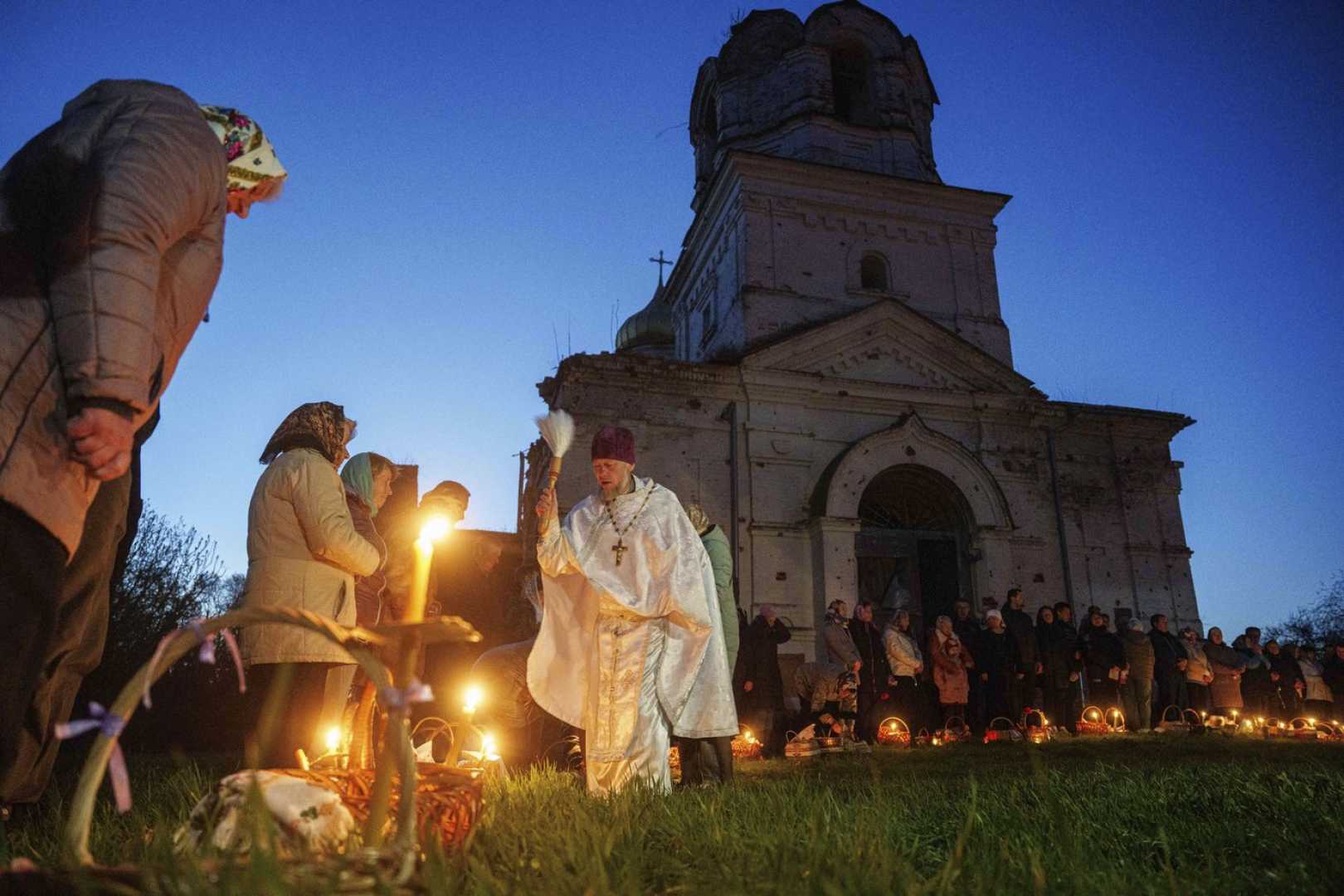World
Ukrainians Celebrate Easter Amid Doubts of Ceasefire with Russia

LUKASHIVKA, Ukraine — Dozens of Ukrainians gathered on Sunday at the ruins of a damaged church in northern Ukraine to commemorate Easter, amidst skepticism about the possibility of a ceasefire with Russia. Russian President Vladimir Putin announced a unilateral Easter truce from Saturday night until midnight following Easter Sunday, citing humanitarian reasons. The announcement came the day after Ukrainian President Volodymyr Zelenskyy stated that negotiations between Ukraine and Russia were reaching a ‘critical point.’
Despite Putin’s declaration, skepticism about the Easter truce prevails. Zelenskyy reiterated Ukraine’s offer for a full, unconditional 30-day ceasefire, urging Russia to respond. He noted that Russian attacks persisted, albeit with diminished intensity, particularly near the border with Russia, where Ukrainian forces hold positions in the Kursk and Belgorod regions. Ukrainian soldiers interviewed by The Associated Press at various frontline positions confirmed that hostilities were ongoing.
In Lukashivka, a village briefly occupied by Russian forces in 2022, parishioners gathered early at a small wooden church built last year to meet the needs of the faithful. They brought baskets and traditional Easter pastries for blessings, standing silently in the spring chill as the silhouette of the destroyed church loomed behind them, its pale walls marked by shrapnel.
Father Serhii Zezul walked among the gathering, exclaiming, ‘Christ is risen!’ as he sprinkled holy water on the baskets, his voice nearly drowned out by the hum of a nearby generator. Restoring the original church, an architectural landmark from the 20th century, would require hundreds of thousands of dollars — a sum the community cannot afford amid ongoing conflict. Since the onset of Russia’s large-scale invasion in February 2022, around 530 churches across Ukraine have been damaged or destroyed, with at least 25 clergymen killed, according to Ruslan Khalikov, head of the ‘Religion on Fire’ project, which monitors Russian war crimes against religious communities.
‘A destroyed church is a shattered soul of the community,’ said Zezul. ‘When churches fall, the heart and nucleus that bind people together begin to collapse.’
The congregation at the damaged church was larger than usual on Sunday. Some attendees traveled from larger towns to Lukashivka to avoid potential attacks on larger gatherings, particularly after a recent series of missile strikes that killed dozens of civilians. Forty-four-year-old Olha Rudeno, a longtime parishioner of a church in nearby Chernihiv, expressed her fears about attending larger city events.
‘But given the conflict, it’s psychologically difficult for me to go to places with large concentrations in the cities,’ she said. Rudeno remains doubtful about the likelihood of a ceasefire with Russia. ‘Believing in a ceasefire is deceiving oneself. I don’t know how long it will take for me to truly believe it’s possible.’
Doubts about a truce have intensified amid stalled negotiations led by the United States. Moscow has largely dismissed a proposed widespread ceasefire supported by Trump and Ukraine, linking any agreement to a halt in Kyiv’s troop mobilization and the supply of Western weapons — conditions Ukraine has rejected, fearing they would allow Russia to regroup and escalate the conflict.
‘My personal opinion is that there will be no ceasefire,’ said Father Zezul. ‘And even if there is, there are no details on where it would apply. On the front lines, our soldiers keep fighting.’
Nevertheless, Zezul noted that celebrating Easter amid ruins reflects the resilience of faith during war. ‘Despite everything, people continue to gather. They believe in something better. We are reborn, rising again. The truth always triumphs over evil. People believe that, hope for that.’
In his Easter message, Zelenskyy reflected on suffering and the struggle to maintain faith. ‘Each of us has lived through such moments… and you wonder: ‘God, why is this happening to us?’ He also referenced the deadly missile attack in Sumy and bombings in Kryvyi Rih, Kharkiv, Dnipro, Odesa, and other cities, emphasizing how people tend to look inward when faced with the incomprehensible. ‘Something invisible yet powerful within us does not let us give up. It shows us where to find the light so we do not lose our way,’ he stated.












